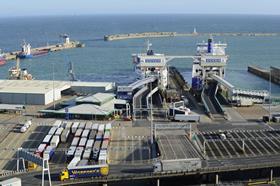
The Port of Dover has warned that government plans to divert traffic to other UK ports after Brexit would cost £2.5 billion, citing a study by Oxera Consulting.
The UK government recently suggested sending food exports to the Netherlands and Belgium via ports in Essex and Suffolk, rather than shipping via Dover to France if the French government imposes new security checks that delay traffic to Calais in the event of a ‘no deal’.
The proposed routes include Harwich to Rotterdam and Felixstowe to Vlaardingen, in the south of the Netherlands.
As the ruling Conservative Party met in Birmingham for its annual party conference, the Port of Dover reminded the government that it handles more international lorries than all other UK ports combined, with up to 110 miles of freight traffic passing through the port every day via 120 ferry sailings.
With around half of the UK’s trade being with the European Union and with the just-in-time supply chains that flow between them keeping factories busy and shops full, the port stressed that delivering a frictionless solution at Dover was vital.
Tim Reardon, head of EU Exit at the Port of Dover, said: “It is clearly good news that the government recognises the need to keep traffic flowing through Dover, not just for the port but for everyone who relies on the goods in the lorries.
“Trying to divert the traffic through other ports is a non-starter. The port capacity isn’t there, and a whole new fleet of ferries would be needed which simply doesn’t exist.
“Successful future trade with Europe must be about delivering a realistic solution. That means a free-flowing Dover, whose speed, efficiency and capacity cannot be replicated without adding significant cost to the supply chain.”
Dover has also been at the centre of contingency planning to minimise disruption in the event of a no-deal Brexit. The port has been working with government for months to deliver the plan, outlined in last October’s Customs Bill white paper, for lorry traffic to be pre-notified to customs so that vehicles do not need to be held at the port.
The ports said the first fruits of that work can be seen in the technical notices published by the government on 24 September, which stated that health controls on animal and plant products from the EU would be carried out remotely, so that vehicles would not need to stop at the port.
Reardon added: “We are determined that our customers can continue to rely on Dover, so that their customers can keep factories busy, shops full and prices low for consumers across the UK.”



